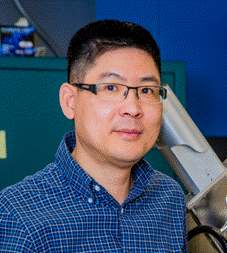Control of “Valley” Properties in 2D Materials by Magnetism
SEMINAR
The State Key Lab of
High Performance Ceramics and Superfine Microstructure
Shanghai Institute of Ceramics, Chinese Academy of Sciences
中 国 科 学 院 上 海 硅 酸 盐 研 究 所 高 性 能 陶 瓷 和 超 微 结 构 国 家 重 点 实 验 室

Control of “Valley” Properties in 2D Materials by Magnetism
Hao Zeng
Department of Physics, University at Buffalo,
the State University of New York
时间:2018年12月17日(星期一)下午1:30
地点:嘉定园区F楼8(2)会议室
欢迎广大科研人员和研究生参与讨论!
联系人:孙宜阳(69906536)
Abstract:
Exploiting the “valley” degree of freedom to store and manipulate information is an emerging direction of condensed matter physics, and provides a novel paradigm for future electronics. Valley is the local extremum in the electronic band structure. Transition metal dichalcogenides (TMDC), such as MoS2, WS2 and WSe2, are semiconductor analogy of graphite with atomic layers bonded together by Van der Waals interactions. A monolayer TMDC with broken inversion symmetry possesses two degenerate valleys that can be selectively excited by circularly polarized light. Breaking the valley degeneracy allows convenient control of valley degree of freedom. This can be done by applying an external magnetic field to Zeeman split the band edge states. We demonstrate that the valley properties can be controlled by magnetism. We show that valley splitting can be enhanced by more than an order of magnitude, utilizing the interfacial exchange field from a ferromagnetic substrate. We further show that transition metal doped TMDs demonstrate ferromagnetism with their magnetization tunable by light. These approaches open up new avenue for valley control for valleytronics applications.
Brif Bio:
 Hao Zeng received his B.S. degree from Nanjing University and Ph.D. from University of Nebraska-Lincoln, both in physics. He was a postdoc fellow at IBM Thomas J Watson Research Center between 2001 and 2004. He then joined the Physics Department at the University at Buffalo, the State University of New York as an Assistant Professor. In 2014 he was promoted to full Professor. He is the recipient of an IBM Research Division Award, National Science Foundation CAREER award, UB Exceptional Scholar-Yong Investigator Award and Lixun Young Scientist Award, Institute of Metal Research, Chinese Academy of sciences. He is an editor of the Journal of Magnetism and Magnetic materials and an editorial board member of Chinese Physics B. He has published 100+ papers in Journals including Nature, Nature Nano., PRL, Nano Letters, JACS, Adv. Mater. and Nano Energy. These papers have been cited for 15,000+ times. Hao Zeng’s research area is in condensed matter and materials physics. His present research interests focus on nanoscale magnetism and spintronics, unconventional semiconductor materials and bio-applications of magnetic nanoparticles.
Hao Zeng received his B.S. degree from Nanjing University and Ph.D. from University of Nebraska-Lincoln, both in physics. He was a postdoc fellow at IBM Thomas J Watson Research Center between 2001 and 2004. He then joined the Physics Department at the University at Buffalo, the State University of New York as an Assistant Professor. In 2014 he was promoted to full Professor. He is the recipient of an IBM Research Division Award, National Science Foundation CAREER award, UB Exceptional Scholar-Yong Investigator Award and Lixun Young Scientist Award, Institute of Metal Research, Chinese Academy of sciences. He is an editor of the Journal of Magnetism and Magnetic materials and an editorial board member of Chinese Physics B. He has published 100+ papers in Journals including Nature, Nature Nano., PRL, Nano Letters, JACS, Adv. Mater. and Nano Energy. These papers have been cited for 15,000+ times. Hao Zeng’s research area is in condensed matter and materials physics. His present research interests focus on nanoscale magnetism and spintronics, unconventional semiconductor materials and bio-applications of magnetic nanoparticles.


 当前位置:
当前位置:

